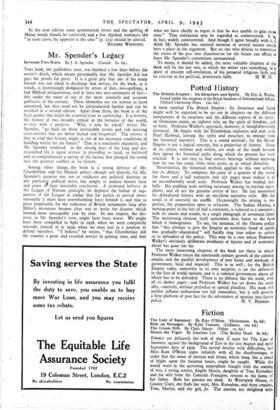Mr. Spender's Legacy
Between Twa.Wars. By J. A. Spender. (Cassell. 8s. 6d.) THIS book, the publishers state, was finished a few days before the writer's death, which means presumably that Mr. Spender did not pass the proofs for press. It is a great pity that one of his many friends was not asked to discharge that service, for the book, as it stands, is distressingly disfigured by errors of date, mis-spellings, a bad Biblical misquotation, and at least two mis-statements of fact— this under the name of one of the most scholarly and accurate publicists of the century. These blemishes are too serious to leave unnoticed, but they need not be particularised further and can be rectified in a second edition. Apart from them, the book is of the hieh quality that might be assumed from its authorship. It is history, the history of two decades critical in the fortunes of the world, written with a purpcse. "Why, it may be asked," writes Mr. Spender, "go back on these irrevocable events and risk reviving controversies that are better buried and foigotten? The answer is that to read this history aright is one of the necessary conditions of building wisely for the future." That is a conclusive argument, and Mr. Spender rendered in the closing days of his long and distinguished life a signal service ln providing so lucid, so balanced and so comprehensive a survey of the factors that plunged the world into the greatest conflict in its history.
Among other things, the book is a strong defence of Mr. Chambjrlain and his Munich policy—though not directly, for Mr. Spender's purpose was not to vindicate any political doctrine or any particullr political move, but simply to analyse known facts and point tIT their inevitable conclusion. A profound believer in the League of Nations principle, he deplores the failure of supporters of the League to realise that for justice to prevail inter-; nationally it must have overwhelming force behind it, and that to press perpetually for the reduction of British armaments long after Hitler's intentions became clear was to invite the disaster which loomed more inescapably year by year. In one respect, the disaster, in Mr. Spender's view, might have been worse. We might have been compelled to fight in 1938, when we were completely unready, instead of in 1939, when we were just in a position to defend ourselves. "I believe," he writes, "that Chamberlain did the country a great and essential service in gaining time, and that what we have chiefly to regret is that he was unable to gain more time." That conclusion may be regarded as controversial. It is, in fact, widely controverted. And though I agree broadly with it, I think Mr. Spender has omitted mention of several factors which have a place in the argument. But no one who desires to transmute the errors of the past into illumination for the future can afford to leave Mr. Spender's contentions unexamined.
To many, it should be added, the most valuable chapters of the bbok will be the last two, in which the writer says something, in a spirit of reticent self-revelation, of his personal religious faith and its relation to his political, democratic faith. H. W. H.






















 Previous page
Previous page